When we write about music on this blog, we always try to pick a musician or band that is unique and has something special. “Sons of Perdition” definitely falls into that category. In this interview Zebulon Whatley gives us an insight into his new album “Gathered Blood” and tells us about his beginnings, why he started making music in the first place and about his creative process.

It’s probably wrapped up in death. It’s nice to leave behind something more than a moldering skeleton that just takes up space. I’ve always drawn and had originally intended to find a career as a painter. I got into music in my teenage years. I don’t suspect I’ll ever make a career out of either.
What bands or musicians inspire you? What are your musical influences?
Musical inspiration is a funny thing. I make a conscious effort to avoid listening to bands that work in similar styles to my own, because I don’t want to unintentionally rip them off. If I were really pinned down to provide an answer, I’d say that it changes a lot. For example, I was listening to a lot of Calexico when we recorded our album “Trinity”, which certainly shows up in the feel of that album. I’ve been listening to more Swans lately, which is present (albeit in a mutated form) on our newest album, “Gathered Blood”. But running beneath that, there’s a constant background of Skinny Puppy, Depeche Mode, and a bunch of New Wave.
Tell me how the project “Sons of Perdition” came to life and why you chose the genre of country music, or more specifically apocalyptic folk and gothic country?
I was screaming and playing guitar in a loud two-piece band when I was in my early twenties. I gradually got tired of yelling and wanted to make something more subdued. I’ve always recorded at home, and I lived in an apartment at the time, so I was forced to record quietly to keep from disturbing my neighbors. I’ve always enjoyed arbitrary restrictions like that. I think they force you to approach problems in a more unique way than having no limitations does. I didn’t set out to make a country album (and it’s very debatable that I actually did). I just wrote songs about the things that interested me at the time. My preoccupations are constantly shifting, so I have to admit that I don’t feel a tremendous connection to any of my past work.
How do you produce and finance your music? Was it difficult to find a label that supports you? Describe the music scene in Austin, Texas. Are there record labels for independent bands?
I record at home, so my costs are minimal, especially when I do digital-only releases. I know that a lot of folks want physical copies of their media, but I’m interested in exploring sound than being a businessman. I’ve never found a label that showed any interest in us, so I started my own. As for the music scene in Austin, I can’t say. I’m practically a hermit. I go to some shows that I like, but most of the bands I’m really interested in either broke up decades ago or only tour as part of big festivals. I’m wholly unequipped to comment on independent record labels in Austin.
In your discography we find references to religion, the old west, alchemy and mysticism. Tell me about the origin of this combination of themes for the albums of “Dissolution Trilogy”.
These are just some of the things that I was interested in when I worked on these albums. I was looking for parallels between a lot of my interests, like alchemical transmutation, religious notions of transubstantiation, and nuclear reactions in “Trinity”. Things get a lot more absorbing when they compound one another. It’s like a symbiotic parasitism.
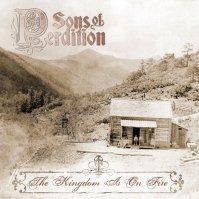
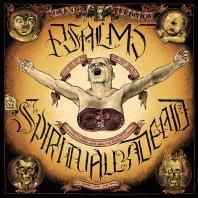
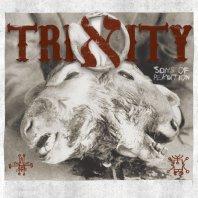
Speak about the literary influences of the southern gothic genre in your songwriting process or your entire discography. What are your favorite authors?
I enjoy reading, but I’m not nearly as well read as I’d like to be. Cormac McCarthy’s “Blood Meridian” is my favorite book. Flannery O’Connor’s “Wise Blood” is up there too. So maybe I’m just into books with the word “blood” in the title. That word shows up in a lot of my work, so I wouldn’t be too surprised.
I discovered your music from your participation in the short film “The Backwater Gospel”. You worked as a voice actor and you made the soundtrack. How was that experience to work with director Bo Mathorne? Some of these songs we can find in the album “The Dissolution Orphans”.
Working with Bo was fantastic. That guy really knows what he wants and he’s able to elucidate his ideas to get his points across. Working as a one-man band, as I had for years leading up to that project, really threatened to turn me into a little Napoleon. Having someone to answer to and explain myself to was a bit of a struggle initially. Thankfully, the end result was better for it. Bo was kind enough to make the music video for our song, “Psalm of Withering” shortly thereafter.
I like the tribute to the band “Those Poor Bastards” on the guitar of your character in the short film. Tell me how you ended up working with Lonesome Wyatt for the albums “Psalms for the Spiritually Dead” and “The Strange Adventures of Edgar Switchblade”.
Ah, the guitar was Bo’s idea. I know “Those Poor Bastards” because my label released their first LP, “Songs of Desperation”. Lonesome Wyatt and I operate in different musical spheres, but I like to think that we’re aesthetically understanding of one another. I asked him to sing on a few of our songs and he did the same for me. When he asked if I’d create the music for the last Edgar Switchblade record, I was happy to do so. Besides, not having to obsess over writing lyrics made it a little vacation for me.
The narrative of each song, the music and the atmosphere are so powerful that it is so easy for the listener to get involved in the world that you create. It would be the perfect soundtrack for a movie, an entire radio theater or audiobook. Did you ever get an offer to make an OST or a song for a feature film?
I’ve had some people show interest, but aside from “The Backwater Gospel”, nothing has ever come to fruition. The beauty and horror of being a self-contained band (as I was for years) is there’s one reason for failure: yourself. With a film project, there are a lot of moving pieces and a lot of things that can go wrong.
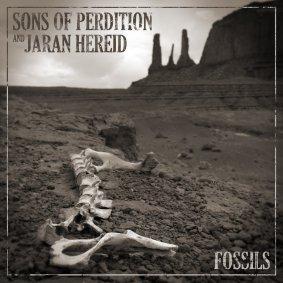
I’m a big fan of “Yuma Sun” and Jaran, and it seems there’s a mutual respect there. As I remember it, we met when he introduced himself and asked if I’d be willing to write lyrics for a song on their second album. “Fossils” is more of a split-EP than a proper album. We each owned half of the songs and contributed to each other’s work where it was needed. I don’t have a set writing process anyways. I try to experiment at every stage of the process because life inside my comfort zone is the death of the creative impulse.
Tell me about the art design of your albums and your cooperation with the German artist Christoph Mueller.
The art has varied between albums. Whether I do the artwork myself or have someone else do it, I try to have the visuals stay true to the album. That being said, if I respect an artist enough to ask him/her to do the artwork, they totally own it. They aren’t drawing my ideas or answering to me. I don’t want to be a manager or inhibit their creativity. Christoph and I have been friends for years. We’ve contributed work toward each other’s projects, collaborated in an art exhibition, and hung out whenever possible. He’s one of the only self-actualized people I’ve ever met, and I’m perpetually in awe of the guy.
Do you also like comics? What titles do your know and read?
I’ve only begun reading comics over the last few years. I was too poor growing up, and there weren’t any comics shops around anyways. I’ve been getting a kick out of Cullen Bunn and Tyler Crook’s “Harrow County”. It checks a lot of my boxes.
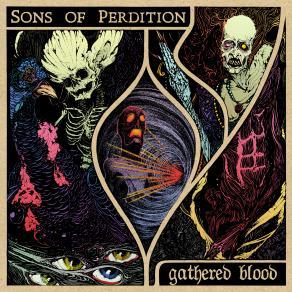
I always tend to think that our albums are much more different than they’re usually perceived, so maybe this is just hyperbole on my part. “Gathered Blood” is definitely the most drastic change we’ve made, both to our sound and to our lyrics. It’s more abstract in both senses. It’s also our darkest work yet.
Yes, this album is also more dark than the others, especially in the atmosphere. And your voice is different in each song. In some tracks I could not even recognize it, like in “The Broadsword” and “Kannibalen von Rothenburg”.
I agree with your assessment. I really tried using my voice as an instrument more than in the past. It was treated as a tool to help build the overall world of each song. I used a strange vocal effect on “The Broadsword” to make the vocals sound like the sexless beasts from the Laird Barron short story that I pulled the song from.
I like the new version of the track “Kannibalen von Rothenburg”. The contrast between the music and the lyrics is interesting. Why did you decide to sing it now in German?
I wanted to sing it in German on “The Kingdom is on Fire” but it didn’t work out. In a lot of ways, I think it sounds more like a “traditional” Sons of Perdition song than anything else on the album.
I feel this album is inspired by horror literature like the works of H.P. Lovecraft and one song is based on Laird Barron’s horror story “The Broadsword”. Why are you fascinated by this universe?
Previous albums usually worked toward a central theme, or even as part of a larger song cycle. With “Gathered Blood”, I wanted to treat the album like a collection of short horror stories. I don’t have the world’s greatest attention span, so I’ve always been drawn to short stories and weird fiction. You get in, build a world, plunder it, and get out. It’s a great way to work. The idea of timeless, cosmic horror in particular has always rang true to me since I started reading Poe and Lovecraft as a kid.
The track “No Escape from Dreamland” has sampled words from the paranormal themed radio program “Coast to Coast” where a man claimed to have worked in Area 51. The musical arrangements you put are very Sci-Fi like in an AM frequency or like a found tape. Do you like Art Bell?
I don’t know anything about Art Bell. I stumbled across the “Area 51 Caller” recording and was smitten. I think it stands alone.
Tell me about the cover that in my opinion symbolizes perfectly the album.
I’ve been looking for an excuse to work with Karmazid for a long time. I’m a big fan of his work. It captures the horrific majesty and decay of the world I was interested in exploring for “Gathered Blood”. I think his drawing works better as a monochrome image, but I feel this is a very colorful album, so I colorized it. I was hoping to release this album on vinyl so I could just gawk at the artwork, but that isn’t feasible right now. The quality of the image demands to be seen full-size.
Do you have any new projects or gigs in the works? Anything you would like to share?
I’m writing a choose-your-own-adventure book right now. It’s ridiculous. Alina Vivita is illustrating it. It’s funny that her drawings are how I see the characters now. I can’t even remember what they looked like in my head beforehand. I’d say it’s about 65% complete right now. I’m also working on some ideas for sculptures and drawings, and trying to get started with some video projects and other random junk. If I don’t keep my brain occupied, it tends to turn in on itself.
This interview was inspired by my love for intermediality, the mixture of music and cinema or music and comics. I asked Zebulon Whatley if he wanted to appear as a cameo in my comic but I ended up also using his lyrics for some scenes in my book. They work as kind of a soundtrack to my comic “He died for us”.
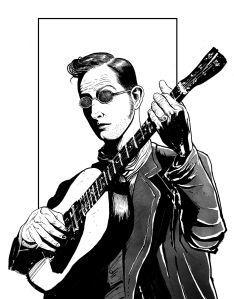
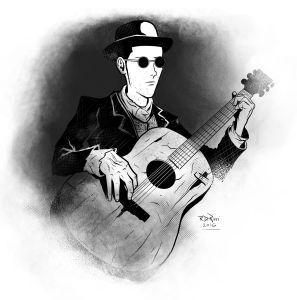
For more information visit:
https://sonsofperdition.bandcamp.com/
http://sonsofperdition.com/



